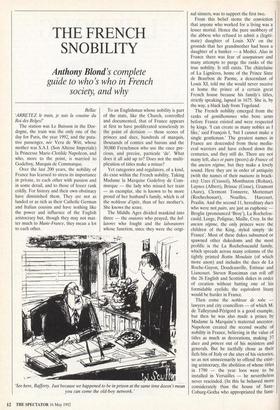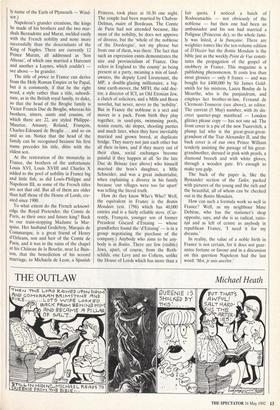THE FRENCH SNOBILITY
Anthony Blond's complete
guide to who's who in French society, and why
Bellac ARRETEZ le train, je suis la cousine du Roi des Beiges!'
The station was Le Buisson in the Dor- dogne, the train was the only one of the day for Paris, the year 1992, and the puta- tive passenger, née Vera de Witt, whose mother was S.A.I. (Son Altesse Imperiale) la Princesse Marie-Clotilde Napoleon, and who, more to the point, is married to Godefroy, Marquis de Commarque.
Over the last 200 years, the nobility of France has learned to stress its importance in private, to each other with passion and in some detail, and to those of lesser rank coldly. For history and their own obstinacy have diminished them. They are not as landed or as rich as their Catholic German and Italian cousins and have nothing like the power and influence of the English aristocracy but, though they may not mat- ter much to Marie-France, they mean a lot to each other.
To an Englishman whose nobility is part of the state, like the Church, controlled and documented, that of France appears at first to have proliferated senselessly to the point of derision — those scores of princes and ducs, hundreds of marquis, thousands of comtes and barons and the 30,000 Frenchmen who use the once pre- cious, and precise, particule 'de'. What does it all add up to? Does not the multi- plication of titles make a minus?
Yet categories and regulators, of a kind, do exist within the French nobility. Taking Madame la Marquise Godefroy de Com- marque — the lady who missed her train — as exemplar, she is known to be more proud of her husband's family, which is of the noblesse d'epee, than of her mother's. She knows the score.
The Middle Ages divided mankind into three — the oratores who prayed, the bel- latores who fought and the laboratores whose function, since they were the origi-
'See here, Rafferty. Just because we happened to be in prison at the same time doesn't mean you can come the old-boy network.' nal sinners, was to support the first two.
From this belief stems the conviction that anyone who worked for a living was a lesser mortal. Hence the pure snobbery of the abbess who refused to admit a (legiti- mate) daughter of Louis XIV on the grounds that her grandmother had been a daughter of a banker — a Medici. Also in France there was fear of usurpateurs and many attempts to purge the ranks of the true nobility. It still exists. The chatelaine of La Lignieres, home of the Prince Sixte de Bourbon de Parme, a descendant of Louis XI, told me she would never receive at home the prince of a certain great French house because his family's titles, strictly speaking, lapsed in 1675. She is, by the way, a black lady from Togoland.
The French nobility emerged from the ranks of gentilhommes who bore arms before France existed and were respected by kings. 'I can create as many nobles as I like,' said Francois I, 'but I cannot make a single gentleman.' The greatest names in France are descended from these media- eval warriors and have echoed down the centuries, and they still do. There are not many left, ducs et pairs (peers) de France of the ancien regime, but they make a lovely sound. Here they are in order of antiquity (with the names of their maisons in brack- ets): Uzes (Crussol), Montbazon (Rohan), Luynes (Albert), Brissac (Cosse), Gramont (Aure), Clermont Tonnerre, Mortemart (Rochechouart), Noailles, Harcourt, Praslin. And the second 11, hereditary ducs who were not pairs, are just as euphonic — Broglie (pronounced 'Broy'), La Rochefou- cauld, Lorge, Polignac, Maille, Croy. In the ancien regime, the only princes were the children of the King, styled simply 'de France'. Most of these dukes subsumed or spawned other dukedoms and the most prolific is the La Rochefoucauld family, which spreads across many columns of the tightly printed Bottin Mondain (of which more anon) and includes the ducs de La Roche-Guyon, Doudeauville, Estissac and Liancourt. Steven Runciman can roll off the 26 English and Scottish dukes in order of creation without batting one of his formidable eyelids; the equivalent litany would be harder in France.
Then come the noblesse de robe — lawyers and city councillors — of which M. de Talleyrand-Perigord is a good example, but then he was also made a prince by Madame la Marquise's maternal ancestor. Napoleon created the second swathe of nobility in France, believing in the value of titles as much as decorations, making 37 ducs and princes out of his ministers and generals. But he tactfully chose as their fiefs bits of Italy or the sites of his victories, so as not unnecessarily to offend the exist- ing aristocracy, the abolition of whose titles in 1790 — the year loos were to be installed in Versailles — he nevertheless never rescinded. (In this he behaved more considerately than the house of Saxe- Coburg-Gotha who appropriated the faun-
ly name of the Earls of Plymouth — Wind- sor.) Napoleon's grander creations, the kings he made of his brothers and the two mar- shals Bernadotte and Murat, melded easily with the French nobility and none more successfully than the descendants of the King of Naples. There are currently 12 Prince Murats, all addressed as `Son Altesse', of which one married a Harcourt and another a Luynes, which couldn't — see above — be grander.
The title of prince in France can derive from the Holy Roman Empire or be Papal, but it is commonly, if that be the right word, a style rather than a title, subordi- nate, as in the British royal family, to duke, so that the head of the Broglie family is Victor Francis Duc de Broglie, whereas his brothers, sisters, aunts and cousins, of which there are 22, are styled Philippe- Maurice, Amaury, Roland, Francois, Charles-Edouard de Broglie ... and so on and so on. Notice that the head of the family can be recognised because his first name precedes his title, ditto with the eldest son.
At the restoration of the monarchy in France, the brothers of the unfortunate Louis XVI, Louis XVIII and Charles X added to the pool of nobility in France big and little fish, as did Louis-Philippe and Napoleon III, so some of the French titles are not that old. But all of them are older than half those of the House of Lords, cre- ated since 1900.
To what extent do the French acknowl- edge the Royal Pretender, the Comte de Paris, as their once and future king? Back to our train-stopping Madame la Mar- quise. Her husband Godefroy, Marquis de Commarque, is a great friend of Henry d'Orleans, son and heir of the Comte de Paris, and it was in the ruins of the chapel at his Château de la Bourlie, near Le Buis- son, that the benediction of his second marriage, to Michaela de Leon, a Spanish
Princess, took place at 10.30 one night. The couple had been married by Chabon- Delmas, maire of Bordeaux. The Comte de Paris had not attended because, like most of the nobility, he does not approve of divorce, but the `whole of the noblesse of the Dordorgne', not my phrase but from one of them, was there. The fact that such an expression exists demonstrates the size and provincialism of France. One refers in England to `the county' as being present at a party, meaning a mix of land- owners, the deputy Lord Lieutenant, the MP, a double-glazing millionaire, a big- time earth-mover, the MFH, the odd doc- tor, a director of ICI, an Old Etonian Jew, a clutch of solicitors, and a Mills and Boon novelist, but never, never to the 'nobility'. But in France the noblesse is a sect and moves in a pack. From birth they play together, in sand-pits, swimming pools, tennis courts, ski slopes, shooting parties and much later, when they have inevitably married and grown bored, at duplicate bridge. They marry not just each other but all their in-laws, and if they marry out of their class, social exchanges become painful if they happen at all. So the late Duc de Brissac (see above) who himself married the boss's daughter, a Mlle Schneider, and was a great industrialist, when explaining a divorce in his family because 'our villages were too far apart' was telling the literal truth.
How do they know Who's Who? Well, the equivalent in France is the Bonin Mondain (est. 1796) which has 40,000 entries and is a fairly reliable sieve. (Cur- rently, Francois, younger son of former President Giscard d'Estaing — whose grandfather found the 'd'Estaing' — is in a group negotiating the purchase of the company.) Anybody who aims to be any- body is in Bottin. There are few (visible) Jews, apart, of course, from the Roth- schilds, one Levy and no Cohens, unlike the House of Lords which has more than a fair quota. I noticed a batch of Rodocanachis — not obviously of the noblesse — but then one had been an ambassador and his son had married a Polignac (Princesse de), so the whole fami- ly was listed, a la francaise. There are weightier tomes like the ten-volume edition of D'Hozier but the Bottin Mondain is the bible just as the weekly Point de Vue consti- tutes the propagation of the gospel of snobbery in France. This magazine is a publishing phenomenon. It costs less than most glossies — only 8 francs — and was bought for £400,000 by Sir James Gold- smith for his mistress, Laura Boulay de la Meurthe, who is the panjandrum, and employs her brother-in-law, Fernand de Clermont-Tonnerre (see above), as editor. The current (5 May) number, with its dis- creet quarter-page masthead — London glitzies please copy — has not one ad. The front cover is a pic of the new Tsarevitch, a plump lad who is the great-great-great- grandson of the Tsar Alexander II, and the back cover is of our own Prince William tenderly assisting the passage of his great- grandmother, dressed in pink with pearls, a diamond brooch and with white gloves, through a wooden gate. It's enough to make you gulp.
The back of the paper is, like the Bystander section of the Tatler, packed with pictures of the young and the rich and the beautiful, all of whom can be checked out in the Bonin Mondain.
How can such a formula work so well in France? Well, as my neighbour Mme Debene, who has the stationer's shop opposite, says, and she is as radical, ratio- Rai and as left of centre as anybody in republican France, 'I need it for my dreams.'
In reality, the value of a noble birth in France is not certain, for it does not guar- antee fortune or favour and in a discussion on this question Napoleon had the last word: `Moi, je suis aneetre.'



















































 Previous page
Previous page